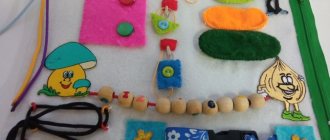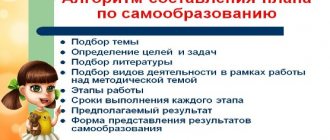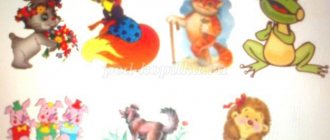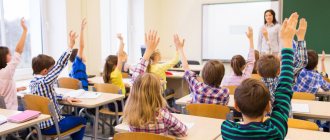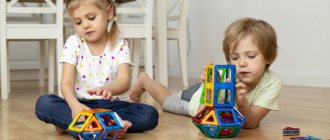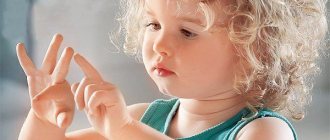The magazine “Preschool Education” is well known to all kindergartens. And it is prestigious to publish material in it.
The journal accepts for publication original, completed scientific and scientific-methodological works of a practice-oriented nature, carried out in the context of current problems in various fields of pedagogy, psychology and related disciplines. The materials provided must reveal various meaningful psychological and pedagogical aspects of the upbringing, development and education of children from 0 to 7 years old; concepts, models, systems for organizing the pedagogical process as a whole or its individual components in the context of preschool education; issues of organization and management of educational institutions at different levels; advanced training of teachers and personnel training.
The article must be written in literary Russian, in a scientific and methodological style, new concepts introduced must have definitions. The material in the article must be systematized, have a clear structure, an evidence base, reveal the problematic nature of the issues covered, and show ways to solve the problem based on the results obtained in the study.
The article must have a practice-oriented orientation, contain materials that allow them to be used in the mass experience of an educational institution, and be accompanied by clarity that reveals the content of the material and confirms the effectiveness of the proposed work. This is especially true for productive activities; articles from work experience. It should be distinguished by novelty, originality, revealing pedagogical creativity and skill of teachers.
Articles must indicate:
- sources (books, manuals, Internet resources, etc.) that formed the basis (used) of the presented material,
- authors whose ideas and books were developed in the proposed publications;
- authors of poems, for songs - authors of music and words.
All articles are reviewed and (or) considered at meetings of the editorial board. The period for reviewing the article is at least three months. No fee is charged from graduate students for the publication of scientific and methodological articles on dissertations. Publication of these articles is royalty-free. The editorial board reserves the right to literary and scientifically edit the content of the article in agreement with the author.
Procedure for submitting materials
An article for the journal is sent to the editorial office by registered mail, by e-mail, or delivered in person.
The article must be submitted by the author in the following package:
- text of the article in Russian and drawings (photos, graphs, tables) on electronic media (floppy disks, CD-ROM, etc.);
- printout of the article with pictures (for archival storage):
The article must be signed by the author.
The period for reviewing materials by the editors is up to three months. After accepting materials for publication, all authors enter into a license agreement with the Publishing House “Education of a Preschooler” in order to comply with copyrights and obligations, both on the part of the publishing house and on the part of the authors. The agreement is sent to the author (team of authors) for signing with a covering letter.
Read more about the rules of publication in the journal “Preschool Education”.
Website of the publishing house “Education of Preschool Children” https://dovosp.ru
Raising children through creative play. (Selection of publications in the magazine “Preschool Education”)
Raising children through creative play.
(Selection of publications in the magazine “Preschool Education”)
1. Galyant I.G. “Organization of artistic and creative activities with children
preschool age in the context of educational integration
process"
annotation
The article highlights the problem of integrative artistic education of preschool children. The possibilities of a group creative project as a form of organizing the educational process are considered. (Magazine “Preschool Education”, 2013, No. 1)
2. O. Tikhonova, Candidate of Pedagogical Sciences, Head of the Department of Artistic and Aesthetic Education of Children, Oryol State University “Decorative drawing in kindergarten.”
annotation
The article talks about the importance of applied folk art in preschool pedagogy, its recognition as an indispensable means of developing aesthetic taste, a humane attitude towards the environment, developing a sense of humor and basic handicraft skills, and forming a personal attitude.
(Magazine “Preschool Education” No. 2-2009).
3. Korobova Tatyana Vladimirovna
“GAMES AND EXERCISES TO DEVELOP CREATIVE IMAGINATION IN PRESCHOOL CHILDREN”
annotation
This methodological development is intended for preschool teachers; it briefly reveals the theoretical aspects of the development of creative imagination in preschool children and presents practical material on the development of creative imagination in preschool children. (Magazine “Preschool Education” No. 4-20010).
4. Takina Raisa Izrailovna “Educational games as a means of developing the creative abilities and intelligence of young children”
annotation
Educational games turn every lesson into a fairy tale. While playing, children gain self-confidence and gain knowledge, which leads to the positive development of the child’s personality and the development of his creative abilities. Educational games are a different method of communicating with a child, fundamentally different from the usual showing, telling, explaining, repeating, i.e. training. Every child can be made creatively developed; As an adult, this person will be proactive, thinking, capable of a creative approach to any task that he would not undertake. Special qualities of the mind, such as observation, the ability to compare and analyze, combine, find connections and patterns - all this constitutes creative abilities. In educational games, children's thinking, observation, and attention improve. (Magazine “Preschool Education” No. 6-20011).
Publication address:
“Electronic journal of a preschool teacher”
- November 9, 2015
Competition “My Pedagogical Initiative - 2015”
Nomination “New educational standards in my practice”
In educational organizations today, the time has come that computers are not perceived as something unreal, then preschool institutions cannot remain on the sidelines, especially since, according to the new law on education, preschool institutions now belong to the first level of education in the Russian Federation.
Due to the fact that our institution has included a kindergarten since 1991, the process of informatization, having begun its penetration from secondary, primary and primary schools, gradually moved into the preschool department. I would like to note that this vector of development is now actively supported by government policy and occupies an end-to-end line in regulatory documents.
Modern realities of life impose not only maternal feelings of love and care for children on the teacher, but also force the teacher-educator to use information and communication technologies in his professional activities. Now a teacher, like a school teacher, must not only use a computer as a means of multimedia support, but also use it as a means of managing the educational process in his group, preschool institution. On the other hand, increasing demands on educators from customers of educational services require him to devote more time not only to children, but also to maintaining various reports accompanying the child’s development process, as one of the means of recording his educational results in a preschool institution.
For this purpose, our school has developed an electronic magazine “EDUCATOR”.
The purpose of developing the magazine was:
1. Connection of all information flows of the teacher into one information node. 2. Systematization of information collected by the teacher about each child and group into a single information resource. 3. Creation on the basis of the magazine of a comprehensive model of information and methodological support for the educational process of a preschool institution.
The electronic journal embodies all the requests of the teachers of our preschool institution. It includes those pages that educators need in their daily painstaking work.
The electronic journal “Educator” contains 33 sheets, each of which has its own function.
- 1 sheet. "Characteristics of the group." Here the teacher gives a general description of the students in his group.
- 2 sheets. “List of the group with personal data.” On this page, the teacher enters personal data about the students and their parents, this page is key, and from this page all information will be duplicated as necessary. The age of each student and the total number of girls and boys in the group are automatically calculated.
- 3 sheet. "Progress ».
- 4 sheets. "Group duty schedule."
- 5 sheet. "Errands."
- 6 sheets. "Attendance".
- Sheet 7 “Health Sheet”.
- 8 sheet. "Seating chart ».
- Sheet 9 “Employment”.
- 10 sheets. "Leisure".
- Sheet 11 “Movement”.
- Sheet 12 “Accounting for payment for preschool education”.
- Sheet 13 “Minutes of parent meetings.”
- Sheet 14 “Topics of parent meetings.”
- Sheet 15 “Attendance at meetings.”
- Sheet 16 “Daily routine”.
- Page 17 “Group Social Passport”.
- Sheet 18 “Psychological portrait of the group.”
- Sheet 19 “Participation in competitions.”
- Sheet 20 “Parental Committee”.
- 21 sheets of “Case Diary”.
- Sheet 22 “Goals and objectives».
- Sheet 23 “Work plan”.
- Sheet 24 “Financial activities”.
- Sheet 25 “Work cyclogram”.
- 26 sheet “Grid of activities”.
- Sheet 27 “Thematic planning”.
- Sheet 28 “Cyclogram of educational activities outside of class.”
- Sheet 29 “Perspective lesson plan.”
- Sheet 30 “Work schedule”.
- 31 sheets “Summer thematic planning”.
- 32 sheet “Self-education”.
- Sheet 33 “Equipment”.
The introduction of an electronic journal into the educational process of a kindergarten has shown many advantages:
- Close contact in the teacher-parent chain.
- Efficiency of management and the ability to compactly store large amounts of information.
- Combining various information flows into a single journal.
In the reflection questionnaire, the teachers of our preschool department expressed only positive feedback about the appearance and implementation of the magazine in the activities of teachers.
“Electronic journal of a preschool teacher.”
Author: Alexey Aleksandrovich Lobanov, computer science teacher, deputy director of MBOU “Secondary School No. 11” in Angarsk, methodologist of the education support center in Angarsk. Angarsk.
Science and education: new times
Scientific and methodological journal “Traditions and innovations in preschool education” 16+
Abbreviated title: Traditions and innovations in preschool education" Transliterated title: "Tradicii i novacii v doshkolnom obrazovanii" International title in English: "Traditions and innovations in preschool education"
Print (printed format):
Certificate of registration of the mass media PI No. FS77-63602 dated November 2, 2015 , (Roskomnadzor). RSCI
No. 1, December 2016
I have an idea!
MODEL OF BUILDING A DEVELOPMENTAL SUBJECT-SPATIAL ENVIRONMENT IN A PRE-SCHOOL EDUCATIONAL INSTITUTION FOR ORGANIZING ADDITIONAL EDUCATIONAL ACTIVITIES FOR PRESCHOOL CHILDREN Liliya Gennadievna Grineva
Innovative forms of work with students and their parents
SAND PLUS INFORMATION TECHNOLOGY EQUALS INTERACTIVE SANDBOX Gin Olga Valentinovna
Corrective work
USE OF GAME METHODS AND TECHNIQUES AT THE STAGE OF SOUND AUTOMATION Borodina Irina Petrovna
MANUAL “Speech Therapy Lotto” Ivantsova Natalya Aleksandrovna
SOME METHODOLOGICAL APPROACHES TO PRODUCING THE SOUND R Pechkareva Evelina Valentinovna , Volodina Lyudmila Alekseevna , Osintseva Irina Alekseevna
Methodical piggy bank
ORGANIZATION OF A DEVELOPMENTAL SUBJECT-SPATIAL ENVIRONMENT FOR THE FORMATION OF MORAL AND PATRIOIC FEELINGS IN SENIOR PRESCHOOL CHILDREN Gribova Ekaterina Sergeevna
INTRODUCING PRESCHOOL CHILDREN TO THE CULTURE OF THE ORYOL REGION Zhidkikh Olga Vladimirovna
DEVELOPMENT OF CHILDREN'S CREATIVE ABILITIES IN THE PROCESS OF THEATER ACTIVITIES Kapninskaya Galina Alekseevna
THE PROBLEM OF ENSURING CONTINUITY IN THE OPERATION OF KINDERGARTEN AND SCHOOL IN THE CONTEXT OF THE INTRODUCTION OF FEDERAL STATE EDUCATIONAL STANDARDS OF PRESCHOOL AND PRIMARY EDUCATION Natalya Nikolaevna Kononenko
THE IMPORTANCE OF FOLKLORE IN THE SPEECH DEVELOPMENT OF EARLY CHILDREN Markitantova Elena Ivanovna
ORGANIZED EDUCATIONAL ACTIVITY IN THE EDUCATIONAL FIELD “SPEECH DEVELOPMENT ” WITH THEATER ELEMENTS FOR CHILDREN OF THE JUNIOR GROUP ON THE TOPIC “BEAR CUBS” Pasechnaya Svetlana Viktorovna
“WINTER IN THE KINGDOM OF CROVING MIRRORS” SCENARIO FOR NEW YEAR’S HOLIDAY Buzinenko Elena Yurievna
FEATURES OF GENDER SOCIALIZATION OF PRESCHOOL CHILDREN IN COMPLETE AND SINGLE-PARENT FAMILIES Dolotenkova Ekaterina Nikolaevna
“WHAT IS WINTER...?” SUMMARY OF Speech Therapy CLASSES IN A MIDDLE GROUP Voistinova Tatyana Mikhailovna, Proshina Olga Vladimirovna, Okun Svetlana Borisovna
Scientific search
ECOLOGICAL TALE AS A METHOD FOR FORMING ECOLOGICAL CULTURE OF PRESCHOOL CHILDREN Tolstoukhova Tatyana Aleksandrovna
Speech development
THE ROLE OF CONNECTED SPEECH DEVELOPMENT IN SPEECH EDUCATION OF PRESCHOOL CHILDREN Metelskaya Elena Mikhailovna
USE OF MNEMOTECHNIQUES AS A NON-TRADITIONAL TECHNIQUE FOR THE DEVELOPMENT OF CONNECTED SPEECH IN PRESCHOOL CHILDREN Razumova Tatyana Aleksandrovna
Social and communicative development
YARD GAMES AS AN ELEMENT OF FORMING A CHILD'S PERSONALITY Lukina Olesya Valerianovna
Preschool management
ORGANIZATION OF WORK ON MORAL AND PATRIOTIC EDUCATION IN A PRESCHOOL EDUCATIONAL INSTITUTION Natalia Nikolaevna Sadovnikova
Aesthetic education
EXPERIENCE OF FORMING EMOTIONAL RESPONSIBILITY IN SENIOR PRESCHOOL CHILDREN THROUGH THEATER ACTIVITIES Tatyana Vyacheslavovna Kostenko
